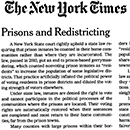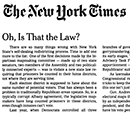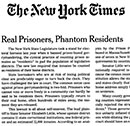Little v. LATFOR documents
Background
The Prison Policy Initiative, as part of a group of organizations representing fifteen voters, intervened in Little v. LATFOR, a case challenging New York's new law allocating incarcerated persons to their home districts for redistricting and reapportionment.
The Brennan Center for Justice, The Center for Law and Social Justice, Dēmos, LatinoJustice PRLDEF, the NAACP Legal Defense and Educational Fund, and the New York Civil Liberties Union joined the Prison Policy Initiative in successfully defending the new law against a legal challenge brought by New York State Senator Elizabeth Little and others.
Previously, legislative districts with prisons were credited with the population of the disenfranchised people temporarily incarcerated there. This practice, often called prison-based gerrymandering, gave extra influence to voters who live in the district with the most prisons, and dilutes the votes of every resident of districts with fewer prisons. The new law corrects this bias, requiring that incarcerated persons be counted as residents of their home communities, in accordance with the New York State Constitution’s provision that incarceration does not change one’s residence. The legislation applies to state and local legislative redistricting, and does not affect federal funding distributions.
The most dramatic examples of prison-based gerrymandering were in upstate counties and cities. For example, half of a Rome City Council ward drawn after the 2000 census is incarcerated, giving the residents of that ward twice the influence of other city residents. Recognizing the distorting effect of prison-based gerrymandering at the local level, thirteen New York counties with large prisons – including four in Senator Little’s district – have historically exercised their discretion to remove the prison populations prior to redistricting.
The new law brings consistency to redistricting in New York, prohibiting the state and all local governments from giving extra political influence to districts that contain prisons. Sen. Little’s lawsuit seeks to have the new legislation struck down, the effect of which would require legislative districts – most notably her own, which contains 12,000 incarcerated persons – to include prison populations in their apportionment counts to the detriment of all other districts without prisons.
Returning to this practice would have not only unfairly inflated the districts of those with prisons at the expense of those without but would have also violated the New York State Constitution.
In December 2011, New York Supreme Court Judge Eugene Devine upheld New York’s law ending prison-based gerrymandering. His decision squarely rejected the plaintiffs’ claim that the New York law violated various provisions of the New York State Constitution. Although the plaintiffs attempted to appeal directly to the New York Court of Appeals, they declined to hear the appeal in February. In March of 2012, the plaintiffs completely dropped their challenge. The most recent round of redistricting complied with the law, bringing consistency to the redistricting process in New York, and prohibiting both the state and local governments from giving extra political influence to districts that contain prisons.
Intervenors and Counsel
The intervenors were:
- Fifteen voters, from both urban and rural districts, who will suffer unfairly distorted representation in state or local government for various reasons, should the new law be overturned.
The proposed intervenors also included:
- NAACP New York State Conference -- The Conference is the state-level body of the NAACP, a membership organization dedicated to protecting and enhancing the civil rights of African Americans and other people of color. The Conference has approximately 90,000 members statewide.
- Common Cause / New York -- CC/NY is the New York branch of Common Cause, a nationwide, nonpartisan organization with 20,000 members in New York State. The group advocates for honest, accountable, and responsive government.
- Voices of Community Activists and Leaders - New York, or VOCAL-NY -- VOCAL-NY is a statewide grassroots membership organization building power among low-income people who are living with and affected by HIV/AIDS, drug use and incarceration, along with the organizations that serve them, to create healthy and just communities.
In addition to the Prison Policy Initiative, the groups providing counsel to the intervenors include the Brennan Center for Justice, the Center for Law and Social Justice, Dēmos, LatinoJustice PRLDEF, the NAACP Legal Defense and Education Fund, and the New York Civil Liberties Union.
Press releases, news coverage & editorials
- New York Law Ending Prison-Based Gerrymandering Stands: Plaintiffs Drop Challenge, March 16, 2012
- NY Court of Appeals declines to hear direct appeal in suit against law ending prison-based gerrymandering, February 14, 2012
 Prisons and Redistricting, by the New York Times Editorial Board, December 22, 2011
Prisons and Redistricting, by the New York Times Editorial Board, December 22, 2011- New York judge rules in inmate legislative redistricting case, by Dan Wiessner, Thomson Reuters, December 5, 2011
- Albany Judge Upholds Law Ending Prison-Based Gerrymandering, December 2, 2011
- Civil Rights Groups Answer Summary Judgment Motion in Prison-Based Gerrymandering Lawsuit, August 19, 2011
- Inmate counting law wins a round, by Jimmy Vielkind, Albany Times Union, August 12, 2011
- Individuals can join lawsuit to defend prison redistricting law, by Jennifer Golson, Thomson Reuters, August 11, 2011
- Judge Allows Civil Rights Organizations Representing Voters to Defend Law Ending Prison-Based Gerrymandering, August 11, 2011
 Oh, Is That the Law?, by the New York Times Editorial Board, July 29, 2011
Oh, Is That the Law?, by the New York Times Editorial Board, July 29, 2011- Rights groups ask court to join prisoner-redistricting suit, by Jennifer Golson, Thomson Reuters, May 27, 2011
- Civil Rights Organizations File Motion to Defend Law Ending Prison-Based Gerrymandering, reported by Dave Lucas, WAMC, May 19, 2011
- Civil Rights Organizations File Motion to Defend Law Ending Prison-Based Gerrymandering; Voters and Community Groups Intervening in Suit to Ensure that All New Yorkers Are Equally Represented in State and Local Legislatures, May 17, 2011
- Electoral fairness held prisoner, by Ekow N. Yankah and Leonard Kohen, Albany Times Union, May 17, 2011
 Real Prisoners, Phantom Residents by New York Times Editorial
Board, April 19, 2011
Real Prisoners, Phantom Residents by New York Times Editorial
Board, April 19, 2011- Don't Turn Back the Clock on Equal Voting Rights in NY, by Ramon Velasquez, The Huffington Post, April 11, 2011
- State debate over prisoners muddies county's redistricting talks, by Robert Brauchle, Utica Observer-Dispatch, April 9, 2011
- Senators challenge inmate count, by David Sommerstein, North Country Pubic Radio, April 8, 2011
- Court Should Reject Lawsuit Seeking to Manipulate Prison Populations in New York Redistricting Voting Rights Groups Support Improved Rules for Counting Incarcerated Persons, April 6, 2011
- Senators Sue Over Prisoner Counting Switch, by Liz Benjamin, YNN, April 5, 2011
Legal documents and related materials
- New York State Section 5 Pre-clearance submission March 7, 2011
- Complaint April 4, 2011
- Department of Justice Section 5 Pre-clearance letter May 9, 2011
- Letter from LATFOR to the Court May 11, 2011
- Answer of New York State Department of Department of Corrections and Community Supervision, May 12, 2011
- Motion to Intervene package, May 17, 2011
- Opposition to Motion to Intervene, June 1, 2011
- Proposed Intervenor's Reply, June 6, 2011
- Joint letter to LATFOR, "Re: LATFOR Non-compliance with Part XX of Chapter 57 of the Laws of New York," July 27, 2011
- LATFOR member Sen. Dilan's response to the joint letter, July 28, 2011
- Plaintiff's Summary Judgment Motion, August 5, 2011
- Attorney General's filings on behalf of Department of Corrections and Community Supervision, August 19, 2011
- Memorandum Of Law In Opposition To Plaintiffs' Motion For Partial Summary Judgment And In Support Of Defendants' Motion To Dismiss Or, In The Alternative, For Summary Judgment
- Notice of Cross Motion
- Affirmation Of Attorney Stephen M. Kerwin, In Opposition To Plaintiffs' Motion For Summary Judgment And In Support Of Defendant DOCCS' Motion To Dismiss And For Summary Judgment
- Exhibit E to Attorney Kerwin's Affirmation
- Affidavit of Robert L Megna
- Affidavit of Joseph F. Pennisi
- Intervenor-Defendants' Motion for Summary Judgment, August 19, 2011
- Proposed Amicus Curiae brief from Senator Martin Malave Dilan, August 22, 2011
- Plaintiffs' Reply in Support of Plaintiffs' Motion for Summary Judgement, September 1, 2011
- Reply Affirmation in Support of Plaintiff's Motion for Summary Judgement and in Opposition to Defendants' Motions for Summary Judgement
- Memo Table of Contents
- Reply Memorandum of Law in Further Support of Plaintiffs' Motion for Summary Judgement and in Opposition to Defendants' Motions
- Exhibit A
- Exhibit B
- Exhibit C
- Exhibit D
- Exhibit E
- Attorney General's filings on behalf of Department of Corrections and Community Supervision, September 14, 2011
- Memorandum of Law in Reply to Plaintiffs' Opposition to Defendants' Motion to Dismiss of for Summary Judgement
- Intervenor-Defendants' Reply in Support of Motion for Summary Judgment, September 14, 2011
- Reply in Support of Intervenor-Defendants' Motion for Summary Judgement And In Opposition to Plaintiffs' Motion for Summary Judgement
- Court's Decision and Order, December 1, 2011
- Plaintiffs' Notice of Appeal, December 8, 2011
- Intervenors-Respondents' letter to the Court regarding the Court's jurisdiction to hear Plaintiffs' appeal, December 23, 2011
- Attorney General's letter to the Court regarding the Court's jurisdiction to hear Plaintiffs' appeal, December 27, 2011
- New York Court of Appeals Decision denying jurisdiction and transferring to Appellate Division, Third Department, February 14, 2012
- Decision (p.8)
- Plaintiffs' letter withdrawing appeal, March 13, 2012
Events
- August 5, 2024:
On Wednesday, August 5, 2024, at 3 PM EST, we’ll host a panel of advocates to discuss the importance and challenges of helping people in prison testify at legislative hearings, and introduce our new legislative testimony toolkit.
Panelists include: Anthony Blakenship of Civil Survival, Jesse White of Prisoners’ Legal Services of Massachusetts, and incarcerated journalist Christopher Blackwell.
Register here.
Not near you?
Invite us to your city, college or organization.
 Prisons and Redistricting
Prisons and Redistricting Oh, Is That the Law?
Oh, Is That the Law? Real Prisoners, Phantom Residents
Real Prisoners, Phantom Residents


